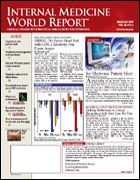Publication
Article
Internal Medicine World Report
Determinants of Sexual Function in Elderly Women
Author(s):
Age, Poor Health More Important than Urinary Incontinence
J Am Geriatr Soc
A large survey of elderly women shows that age and overall physical and mental health have more of an impact on whether a woman is sexually active than continence status (. 2006; 54: 1220-1224).
Although urinary incontinence affects 17% to 55% of elderly women, little has been known about its effects on sexual function. This study surveyed 2361 community-dwelling Canadian women (mean age, 71). In the entire population, 39% reported urinary incontinence, and 27% said they were sexually active.
P
Marital status and age were the strongest predictors of being sexually active, followed by physical and mental health. Having a good body image positively correlated with sexual activity, but only when age was factored in; overall older women were more likely to have a good body image than younger women ( = .003).
Frequency of urinary incontinence did not affect sexual activity. And those with stress incontinence were more likely to be sexually active compared with women who had other types of incontinence (Table).
However, increased amounts of urine loss and nocturnal incontinence were independently associated with lack of sexual activity.
This study was limited by 2 factors: single (divorced or widowed) women with regular partners were not included in the survey, which could also not determine whether the participants’ partners might have had physical or emotional problems that would have limited sexual activity.
The results do, however, suggest that “women remain sexually active regardless of continence status, and that poor health is an important explanatory variable that may have confounded results from previous ºstudies failing to show that improvements in urinary continence lead to enhanced sexual function,” the authors write.
(
These findings also imply that even if urinary incontinence treatments improve, it would not necessarily translate into more sexual activity in this population, Tomas L. Griebling, MD, writes in an accompanying editorial pages 1290-1291).
Dr Griebling reminds physicians to ask their elderly patients specific questions about their sexual functioning, “because many older adults will not volunteer this information or raise questions themselves.”





